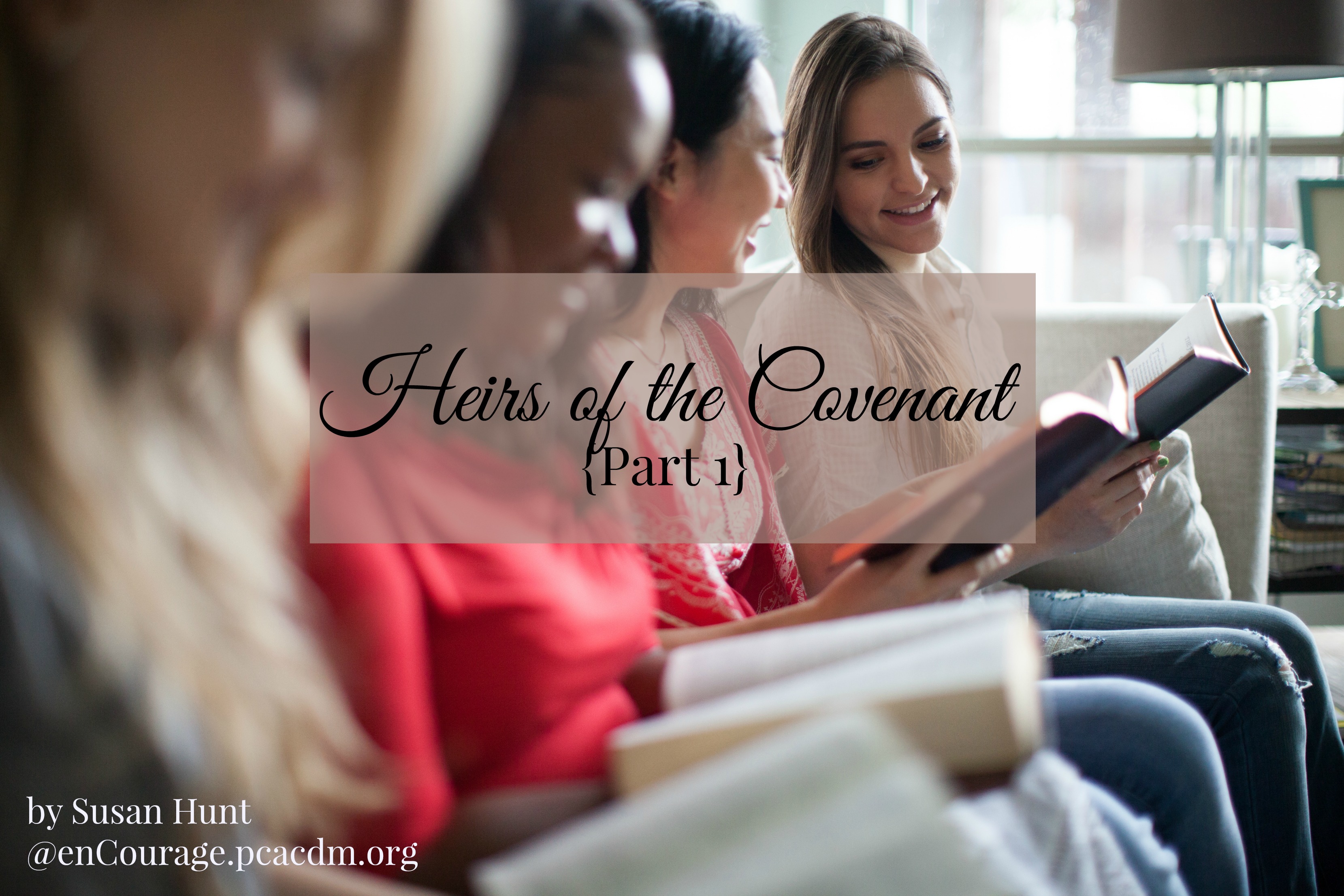SUSAN HUNT | CONTRIBUTOR
Editor’s Note: This is the first in a series of articles by contributor, Susan Hunt. When we think of Susan and her writing, her books Spiritual Mothering or By Design often come to mind. Her book, Heirs of the Covenant is a favorite of mine and I asked her to write something based on that book. I hope this series helps you see God’s covenant in new and richer ways.
Nineteen years ago I wrote the following in the Introduction to Heirs of the Covenant:
I am surprised I am writing this book. I have believed for years it should be written but thought someone else should write it. I am neither a theologian nor a scholar. But God would not excuse me for those reasons. In fact, I finally concluded that because this book is not for theologians and scholars, God would use an ordinary person to write it so ordinary people would use it. (p. 16)
I’m still surprised the Lord used me to write it. Here’s some of the backstory.
After writing Sunday school curricula for Christian Education (now CDM) and Great Commission Publications, I became Coordinator of Women’s Ministry. As I talked with women, I had a growing sense that in some churches there was ministry-specialization but little coordination or appreciation between the various ministries. This compartmentalization often led to competition. And then, I realized this autonomy was alive in my own heart.
At a deep level I knew this was wrong. I knew that if I intellectually or emotionally disconnected women’s ministry from the whole of church life, I would diminish women’s ministry. I intuitively knew this because for several years the men I worked under patiently and relentlessly taught me to think and write covenantally. When I became Coordinator of Women’s Ministry, I disconnected from one ministry and connected to another. My discomfort with this disconnect drove me to my covenantal roots.
I’m captivated by the covenantal framework of Scripture. There is a fascinating phrase in the answer to question 4 of the Westminster Larger Catechism:
- How doth it appear that the scriptures are of the word of God?
- The scriptures manifest themselves to be the word of God, by their majesty and purity; by the consent of all the parts, and the scope of the whole, which is to give all glory to God . . .
All parts of Scripture agree because there is a meta-narrative—one over-arching story—of God’s covenant promise to send a Redeemer so His people can live in His presence and reflect His glory. Thinking covenantally helped me see the meta-narrative of ministry—all parts of a church’s ministry should agree with all other parts because the scope of the whole is God’s glory.
Sidebar: the consent and scope principle also applies to life. No matter how chaotic things may seem at any given time, every part of life agrees with every other part in order to give all glory to God. There is nothing random. Everything matters.
As I thought about the implications and applications of covenant theology, I came to a conclusion:
Much has been written about the content of the covenant, but little about the day by day, week-by-week, generation by generation privileges and responsibilities of living in covenant with God and with His people… how the content of the covenant is lived out in the context of the covenant community, and how it culminates in authentic Christianity. (p. 15)
I don’t remember how long I waited until I mustered up courage to ask Dennis Bennett, my friend and colleague in the CDM office, to read Heirs, but a few days later he said, “A woman had to write this book. The covenant is nurturing, and it took a woman to see the nurturing implications of covenant theology.”
Dennis’ words continue to have a profound effect on me. They showed me that when women are discipled to think biblically and live covenantally, they will nurture covenant relationships with one another according to Titus 2:3-5. They will become corporate helpers and life-givers to God’s covenant family and covenant life in God’s church will be sweeter and stronger. Writing Heirs clarified for me that a women’s ministry coordinator is not called to simply build a strong women’s ministry, but to be part of building a strong church.
Covenant is a compelling idea. Covenant is the storyline of the grandest of stories, a story that began before the beginning of time when God chose us in Christ to be His own (Ephesians 1:4), exploded into time and space when God created us in His image (Genesis 1), was scandalously lost when our first parents rebelled (Genesis 3:1-7), was graciously restored when God promised a Redeemer (Genesis 3:15), was gloriously fulfilled when the Word became flesh (John 1:14), and will reach its spectacular consummation when we hear “a loud voice from the throne saying, ‘Behold, the dwelling place of God is with man. He will dwell with them, and they will be his people, and God himself will be with them as their God.” (Revelation 21:3). And wonder of wonders, “if you are Christ’s, then you are Abraham’s offspring, heirs according to promise” (Galatians 3:29) because “he predestined us for adoption through Jesus Christ” (Ephesians 1:5) into His covenant family.
Reflections for Women’s Ministry
How does covenant inform the way you think about Scripture, life, ministry?
What are your reactions to the idea of the covenant being nurturing?
What are some ways women in your church make covenant life stronger and sweeter?


